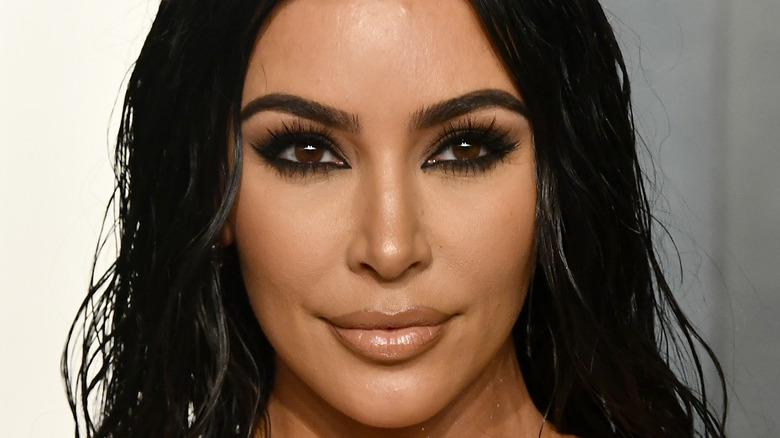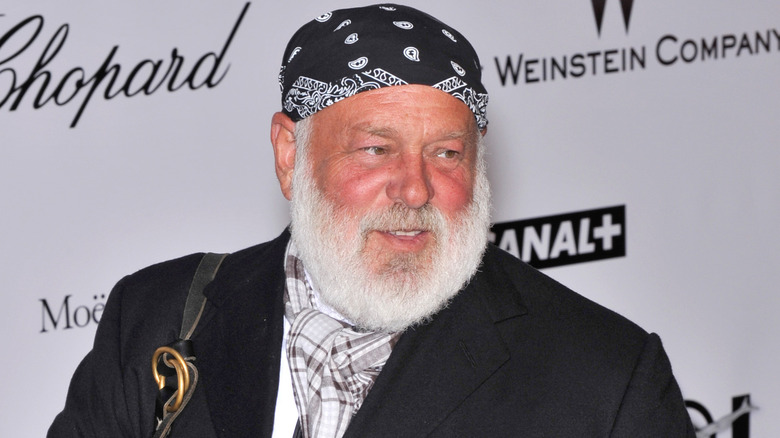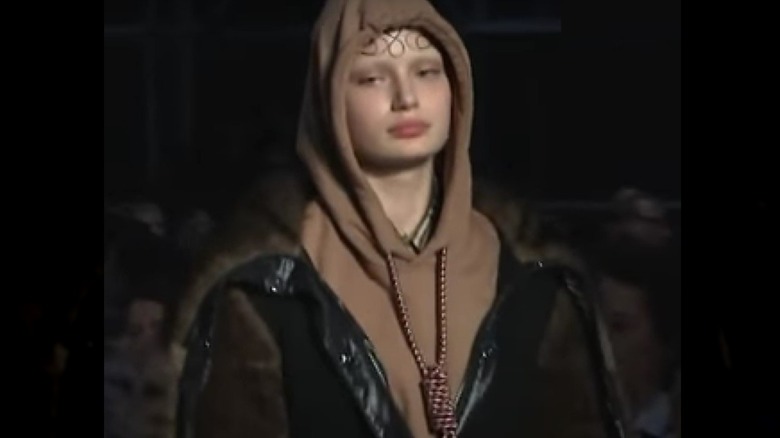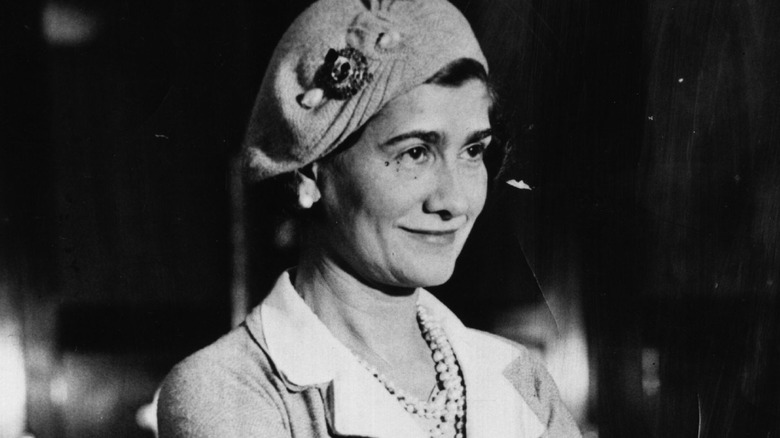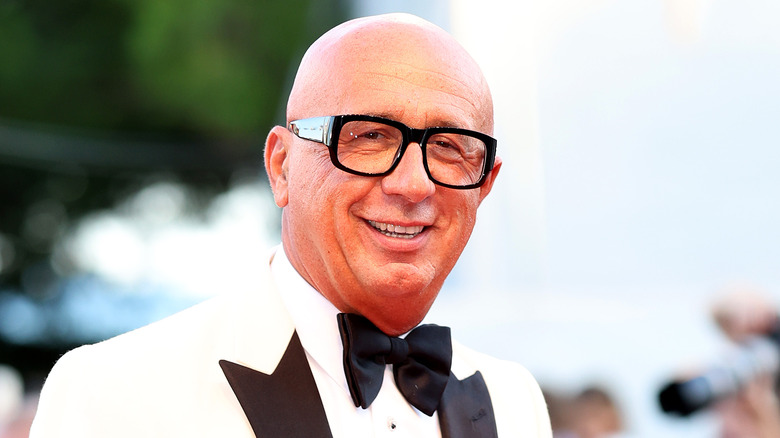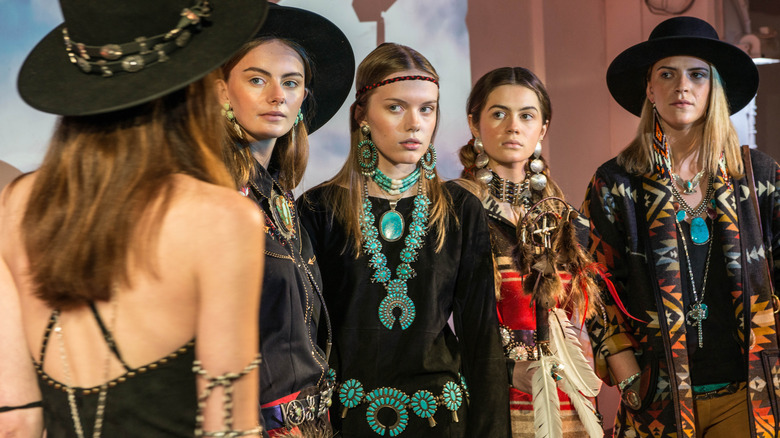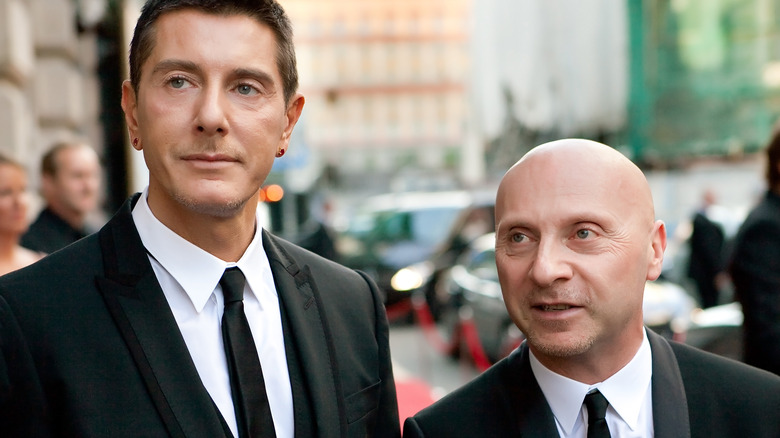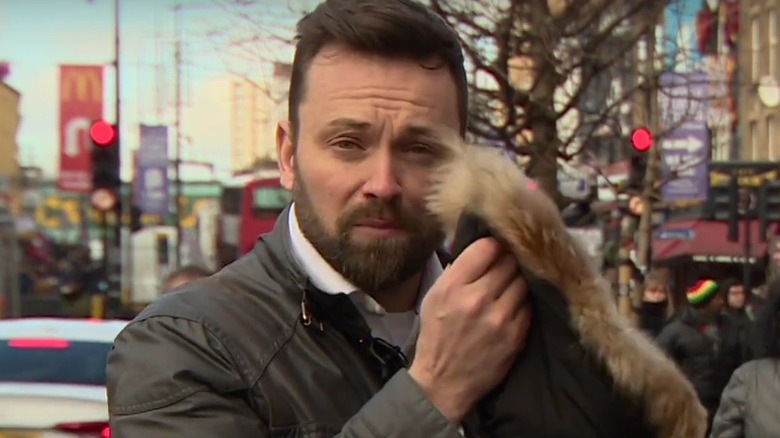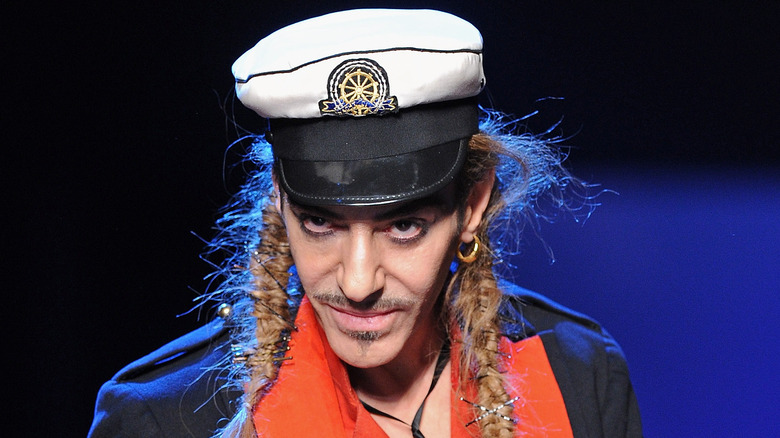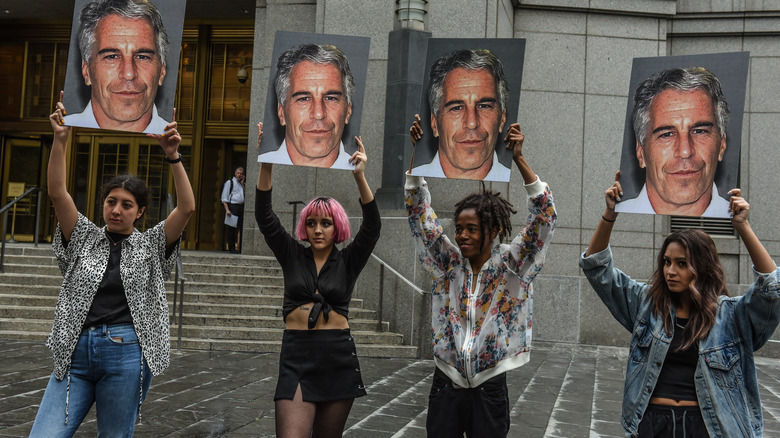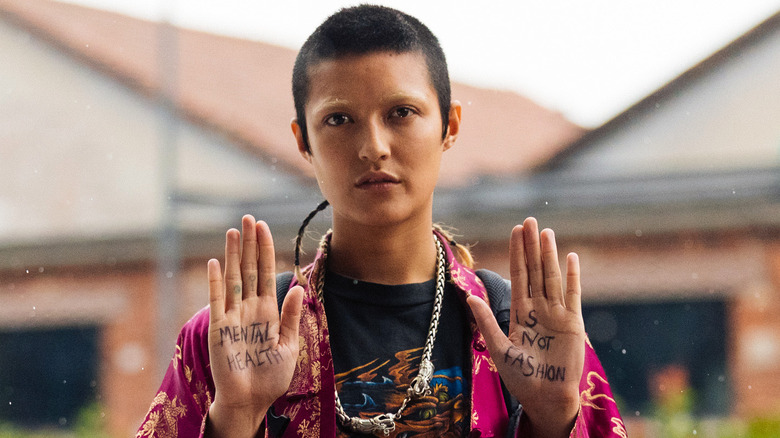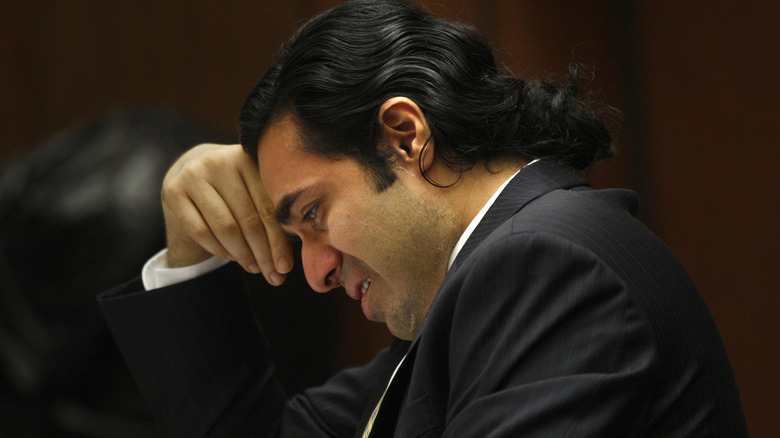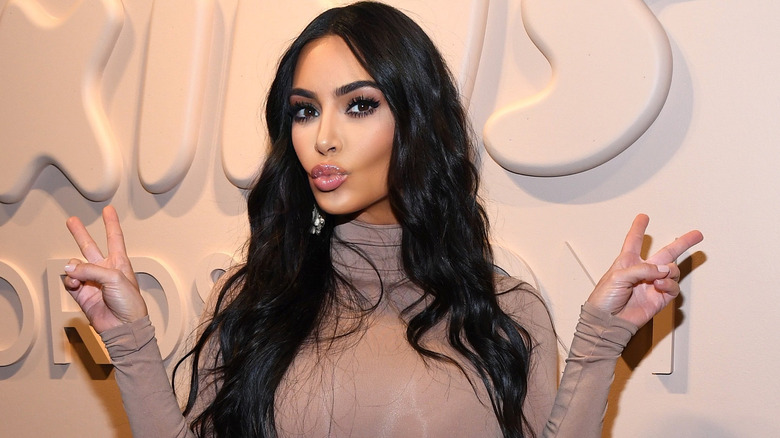Huge Scandals That Rocked The Fashion Industry
The following article contains references to mental health issues, suicide, eating disorders, and allegations of sexual assault, child abuse, and racism.
With tales of exploitation, abuse, racism, and overall body negativity, the fashion industry isn't exactly known for being morally upstanding. Granted, in more recent years, efforts have been made to rectify these ills. With Ashley Graham being hailed as a plus size supermodel in 2016, there's certainly been a shift, albeit a gradual one, toward size inclusivity. Meanwhile, the Black Lives Matter movement has been highly influential in the increased diversity within fashion from 2020 onward, as BBC Style noted.
Nevertheless, the fashion world has a dark and sordid history — one that is hard to ignore. For decades, it was routine for designers such as the late Karl Lagerfeld to openly boast about his unabashed fatphobia and general aversion to any physique that didn't fit a literally and metaphorically narrow ideal. This body negativity undoubtedly bled into the industry as a whole (lest we forget the harmful size zero trend of the mid-2000s). And then there's the pervasive bigotry faced by marginalized groups. In 2008, Jourdan Dunn became the first Black woman to walk a Prada runway since Naomi Campbell graced the brand's catwalk a decade earlier. Meanwhile, Talulah-Eve was the only trans model at London Fashion Week in 2017, highlighting a lack of inclusivity that still blights the runway.
With this in mind, it comes as little surprise that numerous scandals have occurred on the sartorial stage throughout the decades. These transgressions aren't fetch today, and they were hardly in vogue when they happened: Let's take a deep dive into huge scandals that rocked the fashion industry.
The Mario Testino and Bruce Weber abuse allegations
In 2018, a group of male models banded together to accuse high-end fashion photographers Mario Testino and Bruce Weber of sexual misconduct. The accusations were particularly shocking due to the esteemed status of the veterans.
In an exposé in The New York Times, 15 male models claimed that Weber pressured them into inappropriate situations on set, namely molestation under the guise of relaxation exercises. "The first thing I was told about Bruce was that he puts people in really precarious situations," model Terron Wood alleged. Likewise, 13 men accused Testino of similar misconduct. Many of the alleged victims said that they didn't speak out after being threatened that doing so would ruin their livelihoods. "Mario behaved often as if it was all a big joke," claimed Thomas Hargreaves, a colleague of Testino. "But it wasn't funny. And the guys being placed in these situations wouldn't know how to react. They would look at me, like, 'What's going on?' ... It was terrible." Soon, the number of Testino's accusers rose to 18.
Jason Boyce, who claimed Weber assaulted him, told The Cut that there was an enduring stigma around male victims of sexual abuse speaking out. "The biggest pushback that I've gotten is, 'Physically you could have just beat him up. Why didn't you?'" he explained. Following the claims, Vogue dropped both photographers, though they denied all allegations against them, per CNN. In 2021, Weber settled sexual assault lawsuits with a number of accusers, per Page Six.
If you or anyone you know has been a victim of sexual assault, help is available. Visit the Rape, Abuse & Incest National Network website or contact RAINN's National Helpline at 1-800-656-HOPE (4673).
Those Burberry noose hoodies
With its iconic check print, British fashion house Burberry surely didn't need to resort to arguably ableist and racist tactics to generate headlines. But in a shocking moment of admittedly haphazard branding, the designers decided to showcase noose hoodies at London Fashion Week in 2019. Yep, you read that right. In a severe case of "What were they thinking?", models were sent waltzing the runway in hoodies that quite clearly had nooses hanging from them, per BBC News.
Understandably, the brand was accused of glamorizing suicide, as well as diminishing the historical impact of lynchings. Burberry model Liz Kennedy, for example, condemned the noose motif on Instagram, accusing those involved of laughing about it behind the scenes and dismissing her own family experiences with suicide. The Guardian argued that the noose motif proved that high-end fashion giants like Burberry were dinosaurs living in a bygone colonialist age, with the design being "indicative of how the fashion industry has been built and how it has failed to adapt to a changing cultural landscape in which a normative, white-western view of the world no longer goes unchallenged."
Following the debacle, Burberry apologized and pledged to implement diversity initiatives. "We are determined to learn from this and have spoken with our employees, experts and communities we impacted, we have developed a plan to increase our consciousness and understanding of social issues and fully embrace diversity and inclusion," CEO Marco Gobbetti said in a statement (via Harper's Bazaar).
If you or anyone you know is having suicidal thoughts, please call the National Suicide Prevention Lifeline by dialing 988 or by calling 1-800-273-TALK (8255).
If you or a loved one has experienced a hate crime, contact the VictimConnect Hotline by phone at 1-855-4-VICTIM or by chat for more information or assistance in locating services to help. If you or a loved one are in immediate danger, call 911.
Coco Chanel's controversial WWII role
Chanel may be one of the most popular and highly coveted brands in the world, but much has been made of its founder's apparent Nazi sympathies and antisemitism. During WWII, Coco Chanel embarked on an affair with Nazi officer Hans Günther von Dinklage, which led to the designer finding a comfy retreat in Paris' Hôtel Ritz as the war raged on, per Biography. According to investigative reporter Hal Vaughan, who wrote the 2012 book "Sleeping with the Enemy: Coco Chanel's Secret War," not only did Chanel become romantically involved with Dinklage, but she apparently helped him recruit agents for the Third Reich, per The New Yorker. "Chanel was, very simply put, an enormous opportunist who did what she had to do to get along," Vaughan argued to the outlet.
Following the war, Chanel was able to re-establish herself in France despite her ties to the enemy, thanks to her connections to the influential Wertheimer family, who still own Chanel (she previously had a dispute with the family after they purchased the rights to Chanel No. 5, a feud that was believed to have been exacerbated by her antisemitism).
In light of Chanel's problematic views and alliance to the Axis, some have suggested that her brand should no longer be lauded as a beacon of high fashion, but instead viewed as a symbol of the designer's far-right sympathies. "It's clear that Chanel's far-right ideologies influenced her designs," fashion writer Tansy Hoskins told Forbes in 2020. "She championed minimalism and the austere. It's very white European."
Gucci's blackface fiasco
The fashion industry has long been accused of racism, with Anna Wintour herself admitting that Vogue had discriminated against Black people, for which she apologized in 2020. Although strides have been made in recent years to tackle the industry's bigotry, racism still rears its ugly head on the runway from time to time. This became no more apparent than when Gucci showcased blackface attire in 2018.
In a baffling move, the brand's website featured a roll neck black sweater with lips, which clearly imitated offensive blackface tropes, leading to an uproar, per The Washington Post. In response, many vowed to burn their Gucci clothing. Some questioned the timing of the racially insensitive garment's release, which coincided with Black History Month. "We have ONE month to celebrate the history of African Americans," The Washington Post columnist Michelle Singletary tweeted. "... We are a nation desperately in need of diversity training."
The company tweeted an apology, calling the incident an important learning curve. Speaking with The Washington Post, Gucci head Marco Bizzarri admitted to being ignorant of the historical impact of blackface and took full responsibility for the authorization of the garment. "I didn't know about blackface," Bizzarri said. "It was easy for me to say, 'Okay, who made the mistake? I'm going to fire you to save my face.' If we made a mistake, I was the person who made the mistake." To rectify the offensive faux pas, the company hired diversity advisers and also invested in community programs and scholarships across the world.
How the deaths of three models sparked a Fashion Week scandal
The fashion industry has long been criticized for favoring unrealistically thin models on the runway. But sometimes, the pressure to stay thin can have catastrophic ramifications. This was the bleak reality for a trio of models who died in the mid-2000s.
As CNN reported, the fashion world was rocked by the deaths of two models, 22-year-old Luisel Ramos and 21-year-old Ana Carolina Reston, who died of anorexia complications within months of each other in 2006. Meanwhile, Luisel's 18-year-old sister, fellow model Eliana Ramos, reportedly died of malnutrition just six months later, per the Daily Mail. Subsequently, London Fashion Week was slammed for using super skinny models in the aftermath of the tragedies. At the time, the size zero trend was in full force despite claims that promoting unrealistically thin physiques contributed to eating disorders in both the models themselves and the young girls who idolized them. The Eating Disorders Association said that while the fashion industry didn't cause anorexia, it contributed to an overarching culture of body negativity, per CNN.
Responding to the backlash, the organizers of London Fashion Week refused to ban super skinny models but claimed they would ensure all models were healthy and over the age of 16 before being vetted to enter the catwalk, as reported by the Toronto Star. By 2012, the British Fashion Council changed their tune and pledged to ban size zero models from the runway, per the Evening Standard.
If you need help with an eating disorder, or know someone who is, help is available. Visit the National Eating Disorders Association website or contact NEDA's Live Helpline at 1-800-931-2237. You can also receive 24/7 Crisis Support via text (send NEDA to 741-741).
Dolce and Gabbana vs. same-sex parents
Despite both being gay, D&G founders Domenico Dolce and Stefano Gabbana gave a controversial interview in which they claimed same-sex couples shouldn't be parents. Speaking with Italian publication Panorama in 2015, the designers expressed some alarming views regarding the so-called erosion of the nuclear family, claiming that surrogacy and IVF are unnatural science experiments, and that same-sex adoption should be discouraged. Big yikes. "I am gay, I cannot have a child," Dolce, for example, asserted in an English translation obtained by HuffPost. "I guess you cannot have everything in life. Life has a natural course, some things cannot be changed. One is the family."
The remarks led to a huge backlash, with Elton John calling for a boycott of the brand. "How dare you refer to my beautiful children as 'synthetic,'" the singer wrote in an impassioned Instagram post. "And shame on you for wagging your judgemental little fingers at IVF — a miracle that has allowed legions of loving people ... to fulfil their dream of having children. ... I shall never wear Dolce and Gabbana ever again." Numerous celebs joined the boycott, with Courtney Love declaring in a since-deleted tweet that she would be burning all her D&G clothes in protest (via PinkNews).
In response to the uproar, the designers told CNN that although they believed in "the traditional family," they did not judge those who chose to have children via IVF.
Faux faux fur
As brands such as Armani and Prada impose a ban on fur, the fashion industry has made immense strides in more recent years to rectify its sordid associations with animal cruelty (who can forget Michael Kors being hit with a tofu pie by activists in 2000?). Thus, with faux fur being as ubiquitous as it is in the modern world, one would easily be forgiven for thinking that animal skins in store windows are a thing of the past. Think again.
Whereas fur was once associated with luxury, it has since made its way into the fast fashion market, albeit surreptitiously. In 2017, it was revealed that real fur labeled as "faux" was being sold at various major retailers in the U.K. An exposé by Humane Society International found that innumerable items were discovered to contain fur trimmings from raccoons, dogs, and rabbits, despite being labeled as 100% polyester. This was apparently done as a shady means of cutting manufacturing costs, as certain furs, such as rabbit, are far cheaper to manufacture in China, where many garment HQs are based.
The revelations caused quite the stir, particularly among animal welfare advocates. "We banned fur farming in the UK in 2000 because it was deemed unethical," Humane Society International spokesperson Claire Bass told Express. "Why are we now paying countries such as China and Poland to keep animals in those exact same conditions?" Subsequently, many retailers, such as Amazon, TK Maxx, and Miss Bardo, pledged to remove fur-based products from their websites and stores.
The Elite Model Management exposé
In 1999, the prestigious modeling agency Elite Model Management was at the center of a major scandal amid seemingly damning allegations. Per the Independent, the BBC released a documentary that appeared to show execs at the agency, namely Gerald Marie and Xavier Moreau, sexually harassing underage girls and making racist comments, leading to their resignations (though they were later reinstated). In the documentary, Marie at one point implied that he planned on seducing models as young as 15. Meanwhile, another scene showed Moreau making shocking racist remarks, declaring, "I don't like Black girls," and "Africa would be OK if they were all white." While Marie later blamed the BBC for supposedly misrepresenting him, he apologized for his offensive language.
According to The Guardian, which was shown footage that didn't air in the documentary, other Elite execs were allegedly also shown using racist language. The agency's director, Roberto Caan, reportedly uttered the N-word, while chaperone Daniele Bianco apparently said, "In Milano they can never use a Black girl." These revelations were particularly shocking considering that Elite represented Naomi Campbell, who had previously criticized the industry for its anti-Blackness. "We all knew racism in the industry was bad but I don't think anybody expected that it would come from the company that is supposed to be promoting such a high profile model as Naomi," sources cited by The Guardian said.
Following the scandal, Elite's owner, John Casablancas, said that he would implement changes to the agency, namely not hiring underage girls for nude shoots or on the runway, per New York magazine.
If you or anyone you know has been a victim of sexual assault, help is available. Visit the Rape, Abuse & Incest National Network website or contact RAINN's National Helpline at 1-800-656-HOPE (4673).
If you or a loved one has experienced a hate crime, contact the VictimConnect Hotline by phone at 1-855-4-VICTIM or by chat for more information or assistance in locating services to help. If you or a loved one are in immediate danger, call 911.
John Galliano's antisemitism revelations
John Galliano was flying high as the creative director of Dior in the '90s and 2000s. That all changed, however, when his alarming views came to light. In an infamous outburst in 2010, Galliano was filmed verbally abusing a group of women in Paris and voicing antisemitic views. According to the Independent, the designer praised the Holocaust for eradicating millions of Jews and declared "I love Hitler." He told one woman that she and her family would have been murdered in the gas chamber had they been alive during WWII. After he was apprehended by police, another woman came forward to allege that Galliano had racially abused her months earlier, while he was also accused of uttering anti-Asian slurs.
Following the video's release, Galliano was fired by Dior. He was found guilty of antisemitic and racist abuse in 2011 and fined €6,000 (around $5,800) by a Paris court, per The Guardian. As highlighted by The Jewish Chronicle, the president of the European Jewish Congress protested that his sentence was too lenient, arguing that it "demonstrates that there appears to be a culture of impunity in the entertainment world." Natalie Portman, who is Jewish and was a Dior brand ambassador at the time, also condemned the designer.
The New Yorker argued that Galliano's pro-Aryan rants were reflective of a problem within high fashion as a whole, one that prides itself on a restrictive beauty ideal. The fashion industry eventually welcomed Galliano back, with him being appointed creative director of Maison Margiela in 2014, per Reuters.
If you or a loved one has experienced a hate crime, contact the VictimConnect Hotline by phone at 1-855-4-VICTIM or by chat for more information or assistance in locating services to help. If you or a loved one are in immediate danger, call 911.
Victoria's Secret's links to Jeffrey Epstein
Although once perceived as the epitome of saucy glamor, the tide has turned on Victoria's Secret in more recent years. In addition to the ongoing contention surrounding the lingerie brand's apparent body negativity, Victoria's Secret was embroiled in further scandal when it was revealed that it allegedly harbored a culture of abuse.
According to a 2019 exposé by The New York Times, the company was once closely connected to pedophile financier Jeffrey Epstein. It was alleged that Epstein served as an adviser to the company's CEO, Leslie Wexner, and the two forged a close relationship. Under the alleged guise of being a modeling scout on behalf on Victoria's Secret, Epstein procured young girls, seemingly enabling him to continue his sex crimes. Model Alicia Arden claimed that Epstein used this tactic to lure her to a hotel room, where he attempted to rape her. "Why would someone that powerful and successful befriend someone like Jeffrey Epstein?" Arden pondered of the billionaire's association with Wexner. "I don't get it."
When artist Maria Farmer — a former employee in the lobby of Epstein's mansion and one of his many victims — asked him why there were so many young girls coming in to see him, Epstein reportedly claimed he was recruiting them on behalf of Victoria's Secret, per The New Yorker. According to The New York Times, Wexner didn't sever his connection to Epstein until a year and a half following his 2006 arrest for child molestation.
If you or anyone you know has been a victim of sexual assault, help is available. Visit the Rape, Abuse & Incest National Network website or contact RAINN's National Helpline at 1-800-656-HOPE (4673).
If you or someone you know may be the victim of child abuse, please contact the Childhelp National Child Abuse Hotline at 1-800-4-A-Child (1-800-422-4453) or contact their live chat services.
The Gucci straitjacket controversy
The execs at Gucci just haven't seemed to learn their lesson. Mere months after the abovementioned blackface debacle, the brand debuted its new runway collection, featuring literal straitjackets, per The New York Times. At the closing show for Milan Fashion Week in 2019, the brand showcased straitjacket anoraks, coveralls, and smocks.
A huge backlash ensued, with model Ayesha Tan-Jones staging a silent protest, as they appeared on the catwalk with "Mental health is not fashion" written on the palms of their hands, according to BBC News. On Instagram, Tan-Jones called out the company for allegedly glamorizing mental illness, noting that LGBTQ+ people are more likely to experience mental health struggles, and the harm that designs like the Gucci straitjacket may cause vulnerable individuals. "It is in bad taste for Gucci to use the imagery of straitjackets and outfits alluding to mental patients, while being rolled out on a conveyor belt as if a piece of factory meat," they wrote in part. "Presenting these struggles as props for selling clothes in today's capitalist climate is vulgar, unimaginative and offensive to the millions of people around the world affected by these issues."
But it seemed creative director Alessandro Michele didn't quite understand the uproar, telling The New York Times that the show was intended as a metaphor for how society suppresses individuality, with Gucci serving as "the antidote" to such conformity. "Uniforms, utilitarian clothes, such straitjackets, were included in the fashion show as the most extreme version of restriction imposed by society and those who control it," Michele explained.
If you or someone you know needs help with mental health, please contact the Crisis Text Line by texting HOME to 741741, call the National Alliance on Mental Illness helpline at 1-800-950-NAMI (6264), or visit the National Institute of Mental Health website.
The Anand Jon Alexander scandal
Fashion designer Anand Jon Alexander built up an elite clientele, including Mary J. Blige and Paris Hilton, after he first rose to fame on "America's Next Top Model," per Fox News. In 2006, the then-30-year-old was featured in a glowing profile in Newsweek, which lauded him as a promising young designer. But Alexander's downfall was looming and, soon enough, he was exposed as a dangerous predator who assaulted dozens of models.
Within one year of his Newsweek profile, Alexander was arrested for raping a teenage model he'd met on MySpace at his apartment after flying her out to Los Angeles, according to ABC News. Thereafter, multiple models accused the designer of sexual assault or rape. He also reportedly filmed the models without their consent. "He threatened me and he said don't ever tell anyone, I could make your career, I could make it awful, you're going to go nowhere if you say anything," one of his victims stated. However, Alexander denied the allegations, with his supporters claiming that the accusers had launched a vengeful conspiracy against him.
In 2009, he was convicted of 14 counts of rape and sentenced to 59 years in prison, per NBC News. In 2020, Page Six reported that Alexander had become a target in jail and was stabbed by a fellow inmate, though he survived his injuries.
If you or anyone you know has been a victim of sexual assault, help is available. Visit the Rape, Abuse & Incest National Network website or contact RAINN's National Helpline at 1-800-656-HOPE (4673).
Kim Kardashian tried to trademark the word kimono
With the seemingly never-ending controversies surrounding the KarJenner clan, one might be inclined to ask, "Is there anything they won't do?" Well, Kim Kardashian arguably surpassed some of our expectations when she decided to trademark the word "kimono," per the Los Angeles Times.
In 2019, Kardashian instigated widespread condemnation amid the release of her shapewear brand Kimono. After an initial backlash due to her admittedly culturally appropriating a Japanese word, she caused further furor when she announced that she planned to trademark the term. Per The New York Times, #KimOhNo began trending, as did a Change.org petition to prevent Kardashian from trademarking the word, started by Sonu Fukunishi. "As a Japanese, I wear Kimono everyday. ... I do not wish to share the word with an underwear brand," Fukunishi wrote in part. "'Kimono' means 'clothing' in Japanese. This is our culture, and I would like to show how many of us do not appreciate this!"
Following the uproar, Kardashian changed the name of the brand to Skims, as she revealed on Twitter. In an interview with WSJ Magazine, she stated that she had listened to her fans and welcomes positive criticism. "You would think we would have obviously thought it through a little bit deeper," Kardashian confessed. "I'm the first person to say, 'Okay, of course, I can't believe we didn't think of this.' I obviously had really innocent intentions. But let's listen. And I want to really listen."

